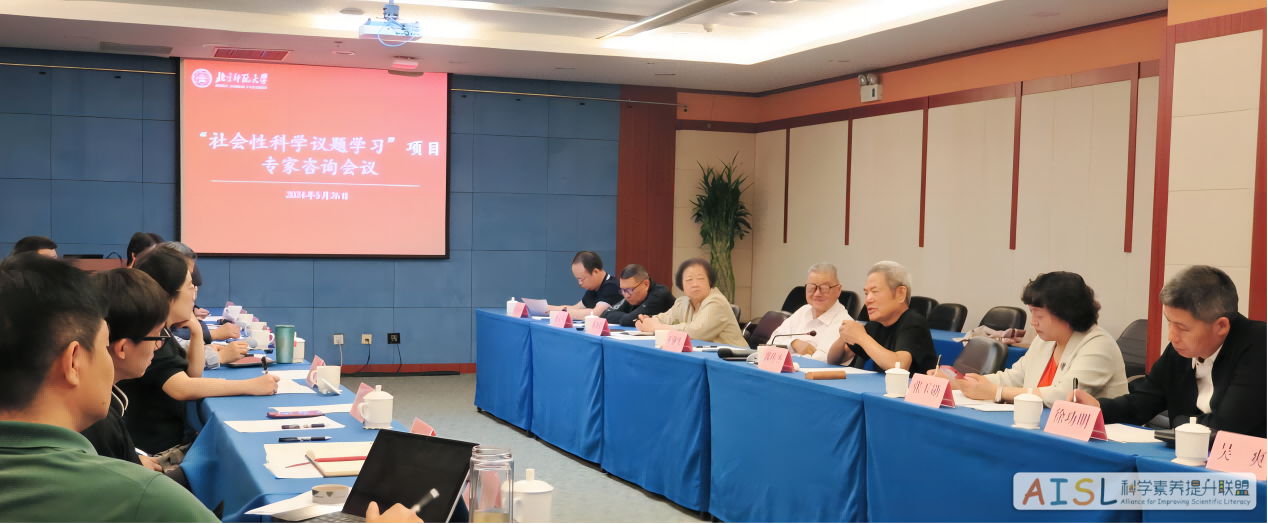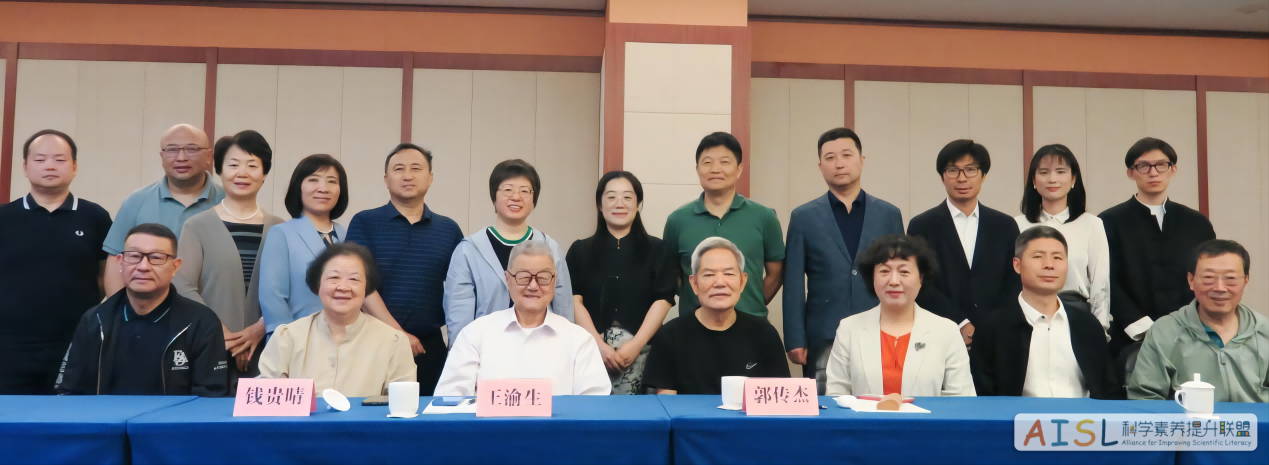为深入贯彻落实总书记关于“要在教育‘双减’中做好科学教育加法”等重要指示和《关于加强新时代中小学科学教育工作的意见》等政策要求,进一步以“社会性科学议题学习”(Socioscientific Issues-based Learning, 简称SSI-L)为载体促中小学五育并举、整体性地发展学生科学素养与核心素养,2024年5月26日上午,“社会性科学议题学习”项目专家咨询会议在京师大厦三楼第一会议室召开。
会议现场
北京师范大学“社会性科学议题学习”项目负责人林静向与会专家汇报了项目的工作进展和年度规划。林静指出,社会性科学议题不仅是科学问题,更是社会问题;具备科学素养的人,不仅仅是具有科学知识和技能,还应该理解科技应用、科技与社会之间的关系以及科技的社会功能。根据2023年6月专家咨询会议精神,项目组对SSI-L的学理基础、实践方式以及议题选择进行了系统梳理,后续将进一步彰显其跨学科、主题式、项目化的综合特点,通过遵循脑、数据驱动、技术赋能的方式,进一步结合学科教学、课堂内外推进SSI-L的理论与实践研究。出席会议的咨询专家对于项目的研究工作进行了科学指导与专业引领。
郭传杰
国际欧亚科学院院士、国家教育咨询委员会委员、中国科学院原党组副书记、中国科技大学原党委书记郭传杰,充分肯定了SSI-L项目的立意与研究进展。郭书记说,顾明远先生的两句话“做造福社会的科学教育,培育心怀天下的未来公民”,很好地概括了社会性科学议题学习项目的研究立意。郭书记指出,SSI-L彰显了科学教育应该具备的探究性与开放性,能培养学生如何看待科学知识的价值观、如何获取科学知识的方法论。郭书记赞许,SSI-L的课题研究虽然时间不长,但跨度已经比较大了,既组织了一批国内一线校长教师开展合作,还与美国加州大学伯克利分校、北卡罗来纳大学教堂山分校等开展合作;在研究上兼具理论性和实践性,且具有很强的跨界性,需要进行跨界的理论研究,包括教育学和心理学的跨界与整合研究。郭书记举例说,孩子的认知水平、认知过程、认知规律等等,心理学以及现代科学技术发展在这些方面的高端前沿研究成果,课题组想到了要将它们贯穿到SSI-L的教学实践和教师培养方面,这非常好。
郭书记进一步提出建议:第一,在议题选择与活动设计上,要坚持以小见大、以大观小,避免泛泛而谈;第二,要注重培养高层次科学教师,特别是能够引导青少年认识和处理社会性科学议题的教师,课题组也可参与国家一些科学教师培训计划,分享研究成果;第三,可往更基础的角度开展研究,例如从脑科学的角度揭示一些认知规律,遵循基础科学规律推进SSI-L的研究与实践,课题组还可积极申报项目、争取国家自然科学基金的支持;第四,加大科学家参与的力度,邀请热衷于教育事业的科学家来更多地参与到课题研究之中,提供咨询、参与讨论,丰富研究视角、提升研究质量;第五,加强案例研究和传播,开发具体、实用的优质教学案例,用于教育实践和传播,进一步提高项目的实效性和影响力。
王渝生
中国科技馆原馆长、党委书记,国家教育咨询委员会委员、中国科学技术协会全国委员会委员王渝生,从国家发展战略的角度,从四个方面肯定了SSI-L的科学教育价值。第一,SSI-L立足三大愿景来提升学生的科学素养,这与《全民科学素质行动计划纲要(2006—2010—2020年)》(以下简称《纲要》)的精神是吻合的;第二,SSI-L不仅强调科学的科学性,还强调科学的社会性、开放性与伦理性,这又拓展了《纲要》中的科学内涵;第三,相比于《纲要》中强调的科学素养“四科加两个能力”(“四科”指了解必要的科学知识、掌握基本的科学方法、树立科学思想、崇尚科学精神,“两个能力”指能够应用“四科”处理实际问题、参与公共事务的能力),SSI-L突出了复杂的社会问题,强调知识和方法的不确定性和问题解决的开放性,能锻炼学生跨学科知识和实践能力;第四,SSI-L为学生提供了良好的科学实践氛围,符合习总书记提到的科技人才成长和培养规律:在科技实践中发现人才,在科技活动中培养人才,在科技事业中凝聚人才。
基于项目进展情况和计划,王馆长提出了四点建议:一是以成果驱动研究与实践工作,可与相关部门合作,制定并发布“实施纲要”之类文本,以明确项目目标、实施步骤和评估标准,为研究者和实践者提供系统性的指导;二是加强科学家参与力度,邀请包括年轻科学家在内的专家学者参与项目研究和科普活动,以提升科学性、开放性和伦理性,同时为项目带来新的视角和创新思维;三是教育要培养人才,首先要发现人才,师资培训要注重熏陶教师“侦探”人才的身份意识,要具备发现人才的眼睛,学会像“伯乐”那样能发现“千里马”;四是要加强面向儿童青少年的SSI-L研究与实践,尽早培养学生对科学的兴趣,兴趣爱好虽有基因的影响,但学校教育发挥着至关重要的引导作用,注意要培育具备科学家潜质、愿意献身科学研究事业的青少年群体,而不是全体青少年,因为有些青少年更具备文学家、艺术家潜质。
张玉勋
中国青少年宫协会副会长张玉勋在交流中表达了对SSI-L项目的肯定和期许,并认为,SSI-L项目在提升儿童青少年科学素养、培养创新思维和实践能力方面有着独特的教育优势,会为青少年宫科技教育活动注入新的活力。对于SSI-L项目组接下来的工作,她建议进一步完善项目组的组织架构、制度规定、工作团队和阵地建设。据张玉勋副会长介绍,各地青少年宫作为与学校教育相互联系、相互补充、促进青少年全面发展的实践课堂,多年来始终坚持立德树人的根本任务,针对青少年的身心特点,精心设计广泛开展了丰富多彩的青少年科技教育实践活动。中国青少年宫协会服务全国各地近千家会员单位,为推动整个青少年宫事业的发展,为会员单位服务,做了很多工作。
《人民日报》潘凡平、中国教育发展战略学会教育教学创新专业委员会理事钱贵晴、《教育家》期刊社社长徐功明、人民教育出版社副总编谭永平、首都师范大学初等教育学院教授白欣、北京大学高等人文研究院陈茂泽、《教育家》期刊社采访部主任吴爽、北京市西城区德胜中学党支部书记李燕玲、北京师范大学亚太实验学校副校长白玉玲、北京师范大学第二附属中学物理特级教师彭梦华、北京市海淀区教师进修学校教育集团生物学特级教师周有祥等与会专家也纷纷提出建议,一是后续要特别关注一线教师的实践案例,尝试从中提炼共性经验;二是需要统筹推进,以顶层设计的纲要来服务一线,特别是结合秋季义务教育新课程新教材使用,探索与国家课程结合的主题,将SSI-L融入课堂教学;三是培养专业化的科技教师,通过培训提升在职教师的科技教育能力;四是开设一些赛事,配合赛事的方式进行推广。
出席会议的北京师范大学中国基础教育质量监测协同创新中心副书记李晓雪、北京师范大学继续教育学院院长助理罗容海、北京师范大学教育基金会强师基金办公室主任徐迟等与与会专家进行了进一步的交流与对话,商议协同合作、助推SSI-L研究与实践纵深发展的机制与平台。
与会嘉宾合影
与会专家从教育、科技、人才对于中国式现代化发展的重要性出发,对SSI-L项目给予高端引领与顶层设计,指导项目的研究与实践更好地服务于中小学科学教育质量提升、中小学生科学素养发展、中小学科学教师队伍建设。汇聚专家智慧与团队力量,SSI-L项目组将进一步坚持理论与实践并重,携手更多力量,协同探索深化素质教育、强师提质、做好科学教育加法等的创新模式与策略,为培养具有全球视野和社会责任感的未来公民砥砺前行。
On the morning of May 26, 2024, the SSI-L advisor consultation meeting was held in the first conference room on the third floor of the Jingshi Building, to facilitate thoroughly implementing the important instructions of General Secretary Xi Jinping on “enhancing science education amidst ‘double reduction’ policy”, carrying out policy requirements such as the “Opinions on Strengthening Science Education in Primary and Secondary Schools in the New Era,” and further using Socio-scientific Issues-based Learning (SSI-L) as a vehicle to promote the integration of moral, intellectual, physical, aesthetic and labor education and the well-rounded development of students’ scientific literacy and core competencies in primary and secondary schools.
Lin Jing, head of the SSI-L project at Beijing Normal University, reported on the project’s progress and annual plan to the attending experts. Lin pointed out that socio-scientific issues are not only scientific issues, but also social issues, and that people with scientific literacy should not only possess scientific knowledge and skills, but also understand the application of sci-tech, the relationships between sci-tech and society, and the social functions of sci-tech. In accordance with the guidance of the advisor consultation meeting in June 2023, the project team has systematically reviewed the theoretical basis, implementation approach and issue selection of SSI-L. In the future, it will further highlight its interdisciplinary, theme-centered and project-based characteristics and adopt the brain-based, data-driven, and technology-enabled approach to further integrate discipline teaching, in- and after-class activities to promote SSI-L theoretical and practical research. The consulting experts present at the meeting provided reasonable and professional comments and suggestions for the project’s research work.
Guo Chuanjie, an academician of the International Eurasian Academy of Sciences, member of the National Education Advisory Committee, former deputy secretary of the Party Committee of the Chinese Academy of Sciences, and former secretary of the Party Committee of the University of Science and Technology of China, highly affirmed the research purposes and progress of SSI-L project. Guo said that Prof. Gu Mingyuan’s statements — “Doing science education that benefits society and cultivating future citizens with a global perspective” — well summarized the research purpose of SSI-L project. He pointed out that SSI-L demonstrates the exploratory and open nature of science education that it should possess, and that it can develop students’ values of how to view scientific knowledge and their methodologies of how to acquire scientific knowledge. Guo praised, although SSI-L project research has not been going on for long, it has already covered a relatively broad range. The project has organized a group of domestic front-line principals and teachers to cooperate with each other. It has collaborated with the University of California, Berkeley, and the University of North Carolina at Chapel Hill, etc. Its research is both theoretical and practical, and has a strong interdisciplinary nature, which requires interdisciplinary theoretical research, such as the interdisciplinary and integrated research in education and psychology. He offered an example, saying that the fields of psychology and modern science and technology development have made cutting-edge research results in areas such as theories of children’s cognitive level, cognitive process, cognitive patterns, etc. The SSI-L research team has considered integrating these into SSI-L teaching practice and teachers’ training, which is excellent.
Guo further provided several suggestions. First, regarding issue selection and activity design, the project team should adhere to the principle of seeing the big from the small, observing the small within the big, and avoid being too general. Second, it should focus on cultivating high-level science teachers, especially teachers who can guide teenagers in understanding and addressing socio-scientific issues. The project team can also participate in some national science teacher professional development programs and share their research outcomes. Third, the project research can be conducted from more fundamental perspectives, such as revealing some cognitive patterns from the perspective of brain science. To advance SSI-L research and practice following basic science principles, the project team can actively apply for national science projects and support from the National Natural Science Foundation. Fourth, the project team should increase the participation of scientists, invite those who are passionate about education to participate in project research, who can provide consultation, participate in discussions, enrich research perspectives, and improve research quality. Fifth, the project team should strengthen case studies and dissemination, develop specific and practical high-quality teaching cases for the use of educational practice and dissemination, and further improve the project’s effectiveness and influence.
Wang Yusheng, former director and party secretary of the China Science and Technology Museum, member of the National Education Advisory Committee and member of the National Committee of the China Association for Science and Technology, took the perspective of national development strategy, and acknowledged the value of SSI-L in science education from four aspects. First, SSI-L is based on the three major visions to improve students’ scientific literacy, which aligns with the spirit of the Outline of the National Science Literacy Action Plan (2006-2010-2020) (hereinafter referred to as the Outline). Second, SSI-L emphasizes not only the scientific nature of science, but also its social nature, openness and ethics, which expands the scientific connotation of the Outline. Third, compared with the “four scientific plus two abilities” of scientific literacy emphasized in the Outline (“four scientific” refers to understanding necessary scientific knowledge, mastering basic scientific methods, establishing scientific minds, and advocating scientific spirit, and “two abilities” refers to the ability to apply the “four scientific” to address practical problems and participate in public affairs), SSI-L highlights complex social problems, and emphasizes the uncertainty of knowledge and methods, as well as the openness in problem solving, which can train students’ interdisciplinary knowledge and practical abilities. Fourth, SSI-L provides students with brilliant opportunities for scientific practice, which is in line with the development and cultivation pattern of sci-tech talents mentioned by General Secretary Xi Jinping, namely discovering talents in sci-tech practice, cultivating talents in sci-tech activities, and gathering talents in sci-tech undertakings.
Based on the project progress and working plan, Wang proposed four suggestions. First, drive the process of the project research and practice by research outcomes. The project team can cooperate with relevant institutes to formulate and issue implementation outlines and other texts, so as to clarify project goals, implementation steps and evaluation standards, and provide systematic guidance for researchers and practitioners. Second, strengthen the participation of scientists, and invite experts and scholars including young scientists to participate in project research and science popularization activities, and thereby enhancing the scientificity, openness and ethics of SSI-L, and bringing in new perspectives and innovative thinking to the project. Third, cultivate talents. The first thing to do is to discover talents. The PD for teacher should focus on developing their awareness of the role of “detecting” talents. Teachers should have sharp eyes for discovering talents and learn to identify “outstanding talents” like a “talent-spotter”. Fourth, the project team should strengthen SSI-L research and practice for young children and adolescents, and develop students’ interest toward science as early as possible. Although interests and hobbies are influenced by genes, school education plays a vital role in cultivating them. It should pay attention to cultivating a group of young people with the potential to be scientists willing to devote themselves to science research. But it’s not targeted at all young people, because some have more potential as writers and artists.
Zhang Yuxun, vice president of the China Youth Palace Association, expressed her affirmation and expectations for the SSI-L project at the meeting. She believed that the SSI-L project has unique educational advantages in improving the scientific literacy of children and adolescents, and developing their innovative thinking and practical ability. It will inject new vitality into the sci-tech education activities of the Youth Palace. For the subsequent work of the SSI-L project team, she suggested further improving the organizational structure, institutional regulations, work team and position construction of the project team. It was introduced by Zhang that the Youth Palaces across many places serve as practice classrooms that are interconnected with school education, complement each other, and promote the well-rounded development of young people. The Youth Palaces have always adhered to the fundamental task of fostering integrity and promoting the well-rounded development of people. Targeted at the physical and mental characteristics of young people, they have carefully designed and carried out a wide variety of practice activities on sci-tech education for teenagers. The China Youth Palace Association serves nearly a thousand member units across the country, and has done a lot of work to serve these member units and promote the development of the entire Youth Palace cause.
Experts at the meeting also put forward several suggestions, including Pan Fanping from People’s Daily, Qian Guiqing, a member of the Professional Committee of Education and Teaching Innovation of China Education Development Strategy Society, Xu Gongming, president of the journal of The Educator, Tan Yongping, deputy editor-in-chief of People’s Education Press, Bai Xin, professor of the School of Primary Education of Capital Normal University, Chen Maoze from the Institute of Advanced Humanities of Peking University, Wu Shuang, director of the Interview Department of The Educator, Li Yanling, secretary of the Party Branch of Desheng Middle School in Xicheng District, Beijing, Bai Yuling, vice principal of Asia-Pacific Experimental School of Beijing Normal University, Peng Menghua, a special-rank physics teacher of the Second High School Attached to BNU, and Zhou Youxiang, a special-rank biology teacher of the Education Group of Haidian District Teachers’ Training School. First, the project team should pay more attention to the practical cases of school teachers in the future, and try to extract some common experiences from these cases. Second, the project team needs to move forward in a coordinated way, and serve the basic education with top-level design outlines. In particular, it should combine the use of new courses and textbooks for the autumn-semester compulsory education, explore themes that are integrated with national courses, and incorporate SSI-L into classroom teaching. Third, the project team should train professional sci-tech teachers, and improve the sci-tech education capabilities of in-service teachers through training. Fourth, it can set up some competitions and promote SSI-L in the form of competitions.
Others who attended the meeting, including Li Xiaoxue, deputy secretary of the Collaborative Innovation Center of Assessment for Basic Education Quality at Beijing Normal University, Luo Ronghai, assistant dean of the School of Continuing Education and Teacher Training at Beijing Normal University, and Xu Chi, director of the Stronger Teachers Force Fund Office of the Beijing Normal University Education Foundation, had further exchanges and dialogues with the experts to discuss mechanisms and platforms for collaborative cooperation to promote the in-depth development of SSI-L research and practice.
Starting from the importance of education, technology, and talents to China’s modernization development, the experts at the meeting provided high-end guidance and top-level design to the SSI-L project. It is suggested that the SSI-L research and practice better serve the improvement of science education quality in primary and secondary schools, the development of scientific literacy of primary and secondary school students, and the construction of science teachers in primary and secondary schools. Bringing together the wisdom of experts and the strength of the work team, the SSI-L project will further adhere to the balance of theory and practice, join hands with more forces, and jointly explore innovative patterns and strategies to deepen quality education, strengthening the teacher force and improving education quality, and enhancing science education, so as to forge ahead in cultivating future citizens with global vision and social responsibility.






